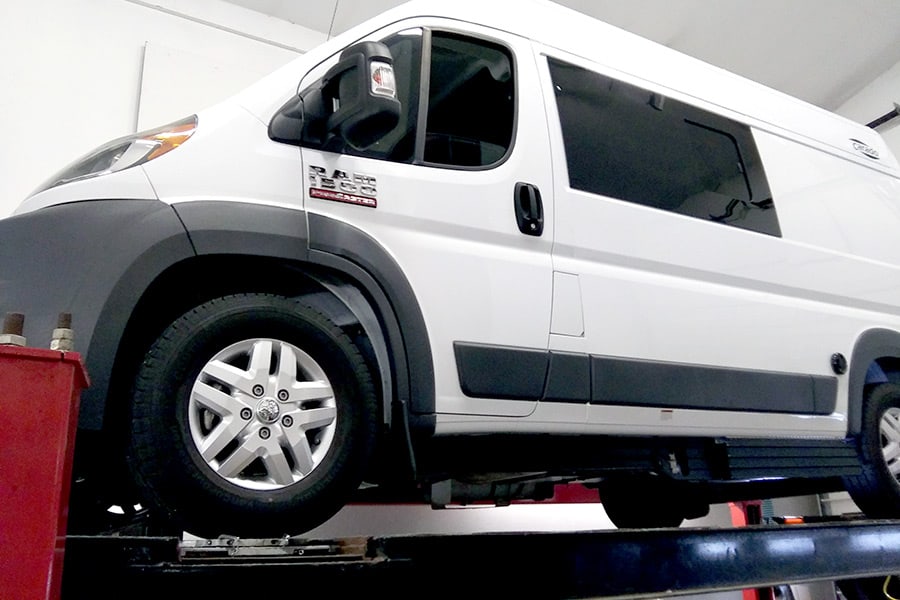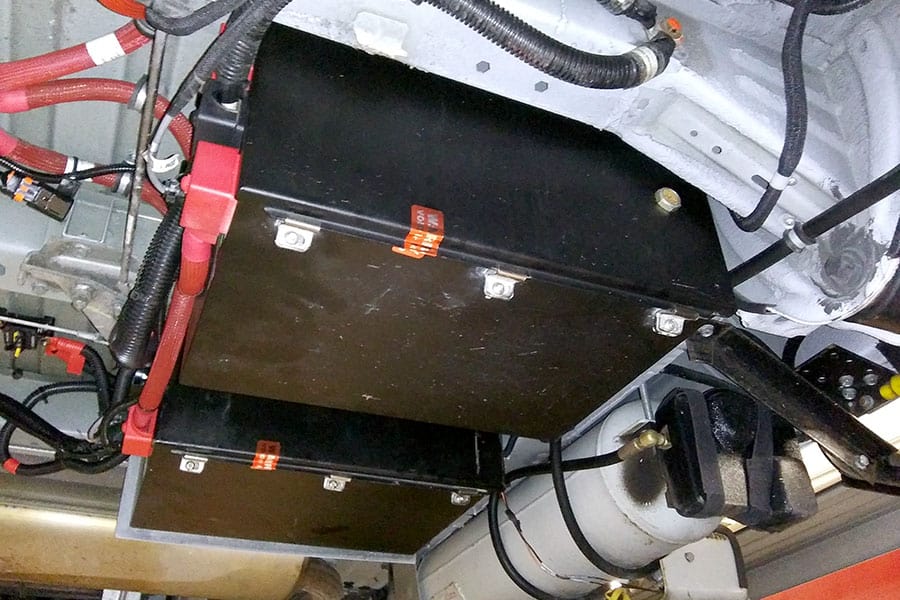
Whether you’re buying, selling, or owning a camper van, getting a habitation check is a good idea. Countless mechanical problems can go wrong, not to mention all of the potential fire hazards, plumbing issues, and other difficulties that might occur.
Fortunately, this post will teach you everything about camper vans and habitation checks, including the 7 things you must know:
- What is a habitation check?
- Do you need one?
- What are the benefits of habitation checks?
- How much money do they cost?
- How often are they recommended?
- Where can you get a habitation check?
- What do you need to do if you get an unsatisfactory report from a professional?
If you’ve ever been concerned about getting a habitation check certificate, or you want to know the step-by-step process, you’re in the right place. Without further ado, let’s jump into all of the details below.
What is a Habitation Check?
A habitation check is a process that involves a mechanic or a camper van professional who’s licensed to do inspections. They look throughout the motorhome for various signs of damage, hazards, and other safety issues that might come up. The purpose is to make sure the vehicle you’re driving isn’t going to breakdown or harm anyone inside.
Despite the invaluable nature of habitation checks, they’re not common everywhere around the world. In fact, only a few countries regularly practice them. That being said, you can drive your camper van to any RV dealership or workshop to have them look through the vehicle. The only thing is that you won’t be presented with a certificate.
If you’re worried about the safety of yourself and your loved ones, or you simply want the certificate for peace of mine, then habitation checks have plenty to offer. It’s important to remember that camper vans are not like ordinary vehicles in the sense that they have plumbing, gas, and electrical components that you don’t find in other vehicles.
Even if you’re knowledgable on the subject, having a professional take a look removes the personal liability if something goes wrong. Checks are also excellent to increase the longevity of warranties and other part replacement deals.
Another function of a habitation check for camper vans is to detect early warning signs that you might not be able to spot without the help of a mechanic. Some issues are difficult to notice if you’re not looking out for them.
Here are several examples of what might be found during a habitation inspection:
- Leaking pipes or weakening plumber’s glue
- Malfunctioning smoke alarms and carbon monoxide detectors
- Electrical shortages and exposed wires
- Ventilation issues
- Gas pipe leaks and clogs
- Water system problems and pump repairs
- Bodywork deterioration
- Fire hazards
The only way to guarantee the complete safety of you and your travel crew is to have a professional camper van inspector review and certify your vehicle. Some people feel that they can skip habitation checks, which is actually okay in many circumstances. Below, you’ll find when you are and aren’t required to have one performed.
Are Habitation Checks Required by Law?
Contrary to popular belief, habitation checks aren’t required to own a camper van. You can purchase one and drive around for many years without ever having to get a certificate. However, there are many benefits that you’ll find in the next section to make you consider whether or not you should get one.
Habitation checks give you peace of mind, but they’re also very beneficial if you want to resell the vehicle. They act as a guarantee that the motorhome isn’t torn to shreds, wasting away, or riddled with problems. If you ever intend to get rid of the camper van, it might be a good idea to get checkups regularly.
Another instance in which you might want to get a habitation check certificate is when you own a camper van that has a warranty. Many warranty contracts are void if you don’t have habitation checks performed as often as they require. You might even lose up to half of the warranty, causing you to pay out of pocket expenses.
There are a few areas of service that require habitation checks, including companies that rent out RVs. If they’re continually renting to new customers, these inspections will verify that nothing was damaged. Not only does it help the company to stay on top of problems, but it also holds customers responsible for issues that they cause.
Finally, RV dealerships that buy and sell used motorhomes are often required to have habitation checks. Keep in mind that habitation checks are performed on and in buildings, vehicles, and other spaces that people live and occupy. Since camper vans are often used as homes on wheels (for short or long periods), dealerships have responsibilities that must be upheld.
Before we check out all of the numerous benefits of getting habitation checks, you’re probably curious about the frequency of inspections and how long certificates are valid. Find the answers to both of those questions and more in the next section.
Other Posts of Interest
- How to Sleep In A Transit Van: Everything You Will Need
- How To Clean Your Camping Stove And Burners: 16 Tips That Work
- Can a Passenger Sleep in a Moving Camper Van?
How Often Are Habitation Checks Required?
Depending on the purpose of the inspection, the length of time between each checkup varies a bit. However, the general thought process is that habitation checks should be performed once a year, preferably within a month or two of the previous inspection.
For example, if you have a habitation check that was verified on January 1, 2020, you should have another no earlier than January 1, 2021, and no later than March 1, 2021. This timespan ensures that you’re not overspending, but it also allows you to stay on top of potential issues that might arise over the year.
You might also be bound to contracts and stipulations by warranties or insurance policies. If they state otherwise, then you should always follow their requirements. Typically speaking, almost every policy, contract, etc. will recommend habitation checks once a year. It’s not very common to have something change so drastically that it makes them worth doing two or three times annually.
The only other time that you could choose to stray from these recommendations is when you’re about to sell the vehicle. For instance, if you already got a checkup 6 months ago, it doesn’t hurt to have another one right before you put the camper van on the market. When people see that it’s safe and operable, they’re more likely to consider purchasing it.
The Benefits of Habitation Inspections
There’s no doubt that it’s always better to get a habitation check than to skip it. Rather than waiting for the sale period or avoiding them altogether, these inspections should be a regular part of the annual maintenance process. There are countless benefits of habitation checks, all of which further backup their importance.
Here are the five most important reasons that you should get a checkup for your camper van:
Peace of mind is worth the investment and time that it takes for most people. Owning a camper van or any other motorhome, for that matter, is a whole new experience compared to traditional vehicles. All of the appliances, electrical wiring, and sewage are too much to keep up with without getting an inspection.
If you want to abide by your warranty and insurance policy contracts, then you might be forced to consider habitation checks. Even if they’re not required in writing, some companies will cause a fuss if something unexpected happens. It’s always good to have a certificate on hand to back yourself up in the event of an accident.
Keeping a record of annual inspections is invaluable. Not only can you remember what problems were and weren’t present each year, but they go leaps and bounds ahead of other camper vans that don’t have certificates when you’re trying to sell yours. Even if it’s expired, never get rid of the certificate.
If you are interested in selling your camper van and want to get the best possible price, read our post about this subject.
If you’re worried about a specific part of the vehicle, such as the refrigerator, then a habitation check will show you what’s wrong with it. You can point out the importance of the appliance to the technician, who will be able to find out the cause of the noise, smell, or other indicating sense.
Finally, some RV parks only allow camper vans and other motorhomes that have habitation check stickers on the window of the vehicle. Even if your camper van is as good as new, they won’t allow you through the gates. Although these types of campgrounds are few and far between, why not broaden your camping horizons?
As you can see, the benefits are very crucial to where you’ll be able to take the camper van, how you drive it, the policies that it has, and many other possibilities. You might be confident in the performance and longevity of the vehicle, but habitation checks will make everyone feel better about dealing with them.

How Much Money Does a Habitation Check Cost?
Now that you’ve seen why you should definitely consider getting a habitation check, it’s time to break down the pricing options. Unfortunately, it’s hard to pinpoint precisely how much money you’ll have to spend since there are so many variables. The average inspection and certificate cost between $100 to $250, but the cost can be affected by a few factors.
Here are the ways that you can save money on your next checkup, as well as factors that might increase the price:
The age of the vehicle could impact the cost of the inspection. This is because older vehicles are much more likely to have problems, as are camper vans with high mileage on the odometer. There can be a few exceptions, but in most cases, it’s safe to say that newer motorhomes aren’t very costly to have habitation checks.
If you’re part of a membership with a motorhome company, you might get a discount on future habitation inspections. They offer different deals that allow you to spread payments throughout the year, cut off a percentage, and slash prices down a bit depending on where you get the certificate.
Some RV dealerships offer a free habitation check upon purchase. It might seem strange to get an inspection on a brand-new vehicle, but the certificate is worth the free price. You’ll be able to get into the previously mentioned strict RV parks, but you’ll also have guaranteed peace of mind for a whole year.
Before you get a checkup, make sure you shop around. Different companies offer different prices, which should come to you as no surprise. If you can pair insurance policies with inspections from the same company, you might be able to score a bundle deal to save hundreds of dollars.
The size of the motorhome that you’re driving, as well as the interior appliances and other components, directly impacts the price of a habitation check. For example, a 45-foot Class A RV would cost much more than a 19-foot Class B camper van. More square footage means more space that the inspector has to look through.
Where Can You Get a Habitation Checkup?
The availability of habitation checks depends on the country you live in.
Habitation checks are common throughout the United Kingdom. You’ll be able to find a licensed professional in most major cities as well as a handful of small towns. However, they’re not very common in the United States and a few other countries. Getting a certificate out of the country won’t really do anything for you or the vehicle.
If you live in an area where they’re frequent, you should be able to find an RV dealership or a mechanic who works on motorhomes that can give you a certificate and an inspection. There aren’t too many businesses that solely focus on habitation checks since they’re only recommended annually.
If you’re having trouble trying to find a place to get the inspection performed, you could call local dealerships or insurance companies. People in the industry are usually familiar with the businesses that do habitation checks, so you don’t need to worry about searching for several hours on end. The only concern might be booking an appointment within your preferred window.
Thanks to the influx of small mobile companies, you could even be lucky enough to find someone who will come to your house to do the inspection. Book an appointment, have them come out, and get your certificate without ever having to drive the vehicle anywhere. They’ll do all the work for you.
Note: Mobile businesses typically charge more money for inspections and certificates since they offer the convenience of coming to you. This might come in the form of an additional fee, or they might just have higher prices in general.
What Do You Do if You Get Bad Results from a Habitation Check?
People always think about habitation checks as a necessary process that gives them a certificate, but they’re much more than that. If a problem is found, you won’t be given anything to verify the safety of your camper van. Unfortunately, you’ll likely have to purchase another inspection on a later date.
The only thing that you can do if your checkup has unsatisfactory results is to fix the problem. Fortunately, it can be as little as replacing a small part of the refrigerator or repairing the gas line behind the oven. Repairmen can deal with the issue for you, but you’ll still have to get another inspection if you want the certificate.
However, there are rare circumstances that result in much bigger problems. For example, if the bodywork on the exterior of your camper van is deemed unsafe, you’ll have a massive issue on your hands. Worn weatherstripping, broken windows, and cracked awning poles are all annoying, but they don’t cost too much money.
On the other hand, leaks through the roof can cause damaged insulation, making the wood rot on the inside of the vehicle. This process might mean that you have to rip out cabinets, cupboards, and drawers, in addition to the parts of the roof. Combine that with rewiring and replacing roof vent fans, antennas, solar panels, and other amenities, and you’ll see the price increase quickly.
In the end, you should always deal with problems before they become much worse. Have a mechanic thoroughly look over the camper van before you buy it if you’re worried. The small fee is worth far more than the thousands of dollars that you’ll have to spend if everything goes out of control.
Conclusion
Habitation checks are preventative inspections, but they also open up countless opportunities. You’ve seen all of the reasons that you should consider having them done yearly, including resale value, insurance policies, warranty contracts, RV park acceptance, and more.
Here’s a quick rundown of everything that this post has taught you:
- Habitation checks aren’t required in most cases, but they’re definitely recommended.
- Look for deals and reduced prices through memberships and new companies.
- Inspections are much more common in the UK, but US drivers can visit mechanics as well.
- Your vehicle must be free of safety hazards, deteriorating appliances, and so on to receive a certificate.
- Habitation checks range in price from $100 to $250, sometimes more.





